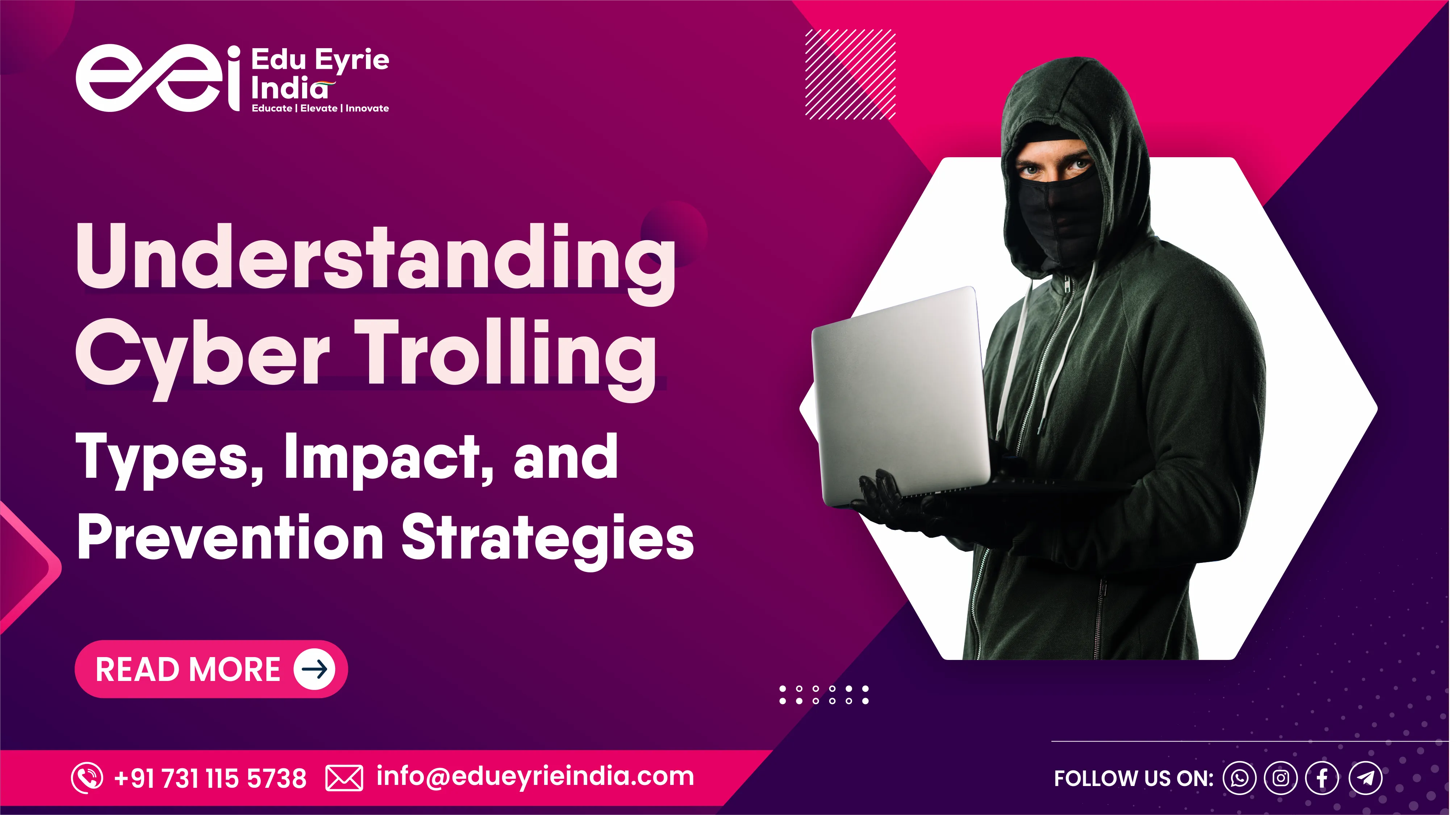Introduction:
Cyber trolling is a disruptive and harmful online behavior where individuals engage in offensive or provocative actions with the intent of causing emotional distress, confusion, or disruption within online communities. This article explores the types of cyber trolls, the psychological and societal impacts of trolling, and practical strategies for prevention and combating cyber trolling, especially in the context of online education and professional communities.
What is Cyber Trolling?
- Cyber trolling refers to the deliberate act of posting inflammatory, harmful, or disruptive content online with the aim of provoking emotional reactions, disrupting normal conversations, or causing distress to individuals. Trolls, who engage in these activities, typically use anonymity to shield their identities, which allows them to engage in personal attacks, spread misinformation, and incite conflicts within digital spaces. Cyber trolling can severely affect its victims, leading to emotional and psychological harm.
Types of Cyber Trolls
Understanding the different types of trolls is crucial for online platforms and communities, especially educational institutions like Edu Eyrie India, to develop strategies for mitigating the negative impact of trolling:
1. Classic Trolls: These trolls post provocative or off-topic messages to stir controversy and provoke reactions. Their primary aim is amusement by creating disruption in online discussions.
2. Flame Warriors: These trolls engage in aggressive conduct, often fueling conflicts with inflammatory remarks to escalate arguments and create tension within communities.
3. Political Trolls: These trolls spread biased content, misinformation, or propaganda to influence public opinion, often leveraging controversial issues to cause division among users.
4. Troll Farms: These are coordinated groups or organizations that use a systematic approach to trolling, usually with political or commercial motivations. They flood platforms with targeted, manipulated content to influence public perception.
5. Impact Trolls: These trolls aim to hurt individuals in real life by spreading false information, doxxing, or organizing cyberattacks. Their actions often have real-world consequences beyond online harassment.
How to Identify a Troll
Recognizing trolls in online spaces is essential for maintaining a safe and productive digital environment. Common signs include:
• Offensive or Provocative Language: Trolls often use derogatory or inflammatory language to provoke others.
• Off-Topic or Irrelevant Comments: Trolls disrupt conversations by posting irrelevant or unrelated content.
• Personal Attacks: Instead of engaging in constructive debate, trolls attack individuals personally, targeting their character or appearance.
• Anonymous or Newly Created Accounts: Trolls often use anonymous or newly created profiles to shield their identity and avoid accountability.
Psychological and Societal Impacts of Cyber Trolling
The effects of cyber trolling extend beyond just the individual target; it can have broader societal implications as well:
• Mental Health Issues: Victims of trolling often experience depression, anxiety, low self-esteem, and in severe cases, suicidal thoughts.
• Isolation and Fear: The emotional toll can lead to isolation and withdrawal from online communities, as individuals fear further harassment.
• Societal Harm: Cyber trolling can erode trust in online communities, normalize harassment, and damage reputations, which may have lasting effects on personal and professional relationships.
Preventing and Combating Cyber Trolling
At Edu Eyrie India, where fostering a positive and productive learning environment is essential, taking proactive steps to prevent and address cyber trolling is crucial. Here are key strategies for combating trolling:
Individual Strategies:
• Educate Yourself About Cyber Trolling: Awareness of trolling tactics enables you to recognize and avoid engaging with trolls.
• Maintain a Professional Online Presence: Be mindful of the information you share online, especially on platforms where professional or academic discussions occur.
• Disconnect When Needed: If online interactions become overwhelming, take a break from social media to reset and regain emotional balance.
• Report Abusive Behavior: Report trolls to moderators or platform administrators, ensuring swift action is taken to remove harmful content.
Platform Strategies:
• Establish Clear Community Guidelines: Online platforms should have clear policies that outline acceptable behavior and the consequences for engaging in cyber trolling.
• Implement AI Tools: Platforms can deploy AI and machine learning tools to detect and flag harmful content before it escalates.
• Provide Education on Digital Etiquette: Promoting digital literacy helps users understand the importance of respectful and responsible online communication.
Societal Strategies:
• Promote Digital Citizenship: Encourage online users, especially students, to practice responsible and respectful online behavior.
• Raise Awareness About Cyber Trolling: Public awareness campaigns can help reduce the stigma around being a victim of trolling and educate the broader community about its dangers.
• Support Research: Funding research on the causes and effects of cyber trolling can provide valuable insights to improve prevention and intervention strategies.
Is Social Media Trolling a Crime?
- While trolling itself may not always be a crime, it becomes illegal when it crosses into harassment, threats, or the dissemination of false information with harmful intent. Legal action can be pursued if actions such as cyberstalking, bullying, or threats are involved. It's important to recognize the difference between free expression and criminal behavior, especially as online harassment can have real-world consequences.
Conclusion:
Cyber trolling is a harmful behavior that can significantly affect individuals, especially in professional and academic spaces. At Edu Eyrie India, we believe in creating a positive and safe environment for learning and professional growth. By adopting preventive strategies, promoting digital literacy, and encouraging responsible online behavior, we can collectively combat cyber trolling and foster a supportive and respectful online community.

